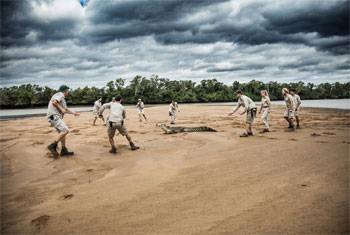Australia Zoo's Croc Trip

Australia Zoo's Croc Trip
This month, Australia Zoo's croc team, the Irwin family and scientists from the University of Queensland (UQ) are once again travelling over 2,000kms north to the Steve Irwin Wildlife Reserve on Cape York. The team will spend a month conducting the most comprehensive crocodile research work in the world.
The saltwater crocodile is an apex predator, critically important to the ecosystems of the waterways in Northern Australia. These modern day dinosaurs are surprisingly shy animals and can be difficult to study in the wild. By using acoustic and satellite trackers we are learning new information about the secrets of the crocodiles. We are currently tracking 150 crocodiles in the Wenlock River and have gathered valuable information to help protect people and crocodiles.
Australia Zoo is proud to be continuing the important research that Steve Irwin began in 1996. The capture techniques that Steve developed ensure that the crocodile's wellbeing is paramount. Crocodiles cannot be sedated the same as mammals, so the team carefully physically restrain the crocs in order to attach the tracking devices. The capture technique is so successful that we sometimes recapture the same crocodile again in a matter of hours. The crocodiles certainly seem to appreciate the free food in the trap!
This study has revealed many previously unknown facts about crocodiles. They can travel 60kms in a single day, and Australia Zoo has tracked crocodiles travelling over 1,000kms from their original capture location. Discovering that crocodiles can hold their breath for over 8 hours means that this research is rewriting biology books.
Toby Millyard, team leader of Australia Zoo's crocodile research team is excited to embark on Croc Research Trip 2017. This important research will help preserve Australia's supreme saurians for future generations.
'While capturing new crocodiles is always a thrill, my favourite part of the croc trip is getting to recapture some of the crocodiles we've trapped in previous years in such a diverse and untouched environment.
Having the opportunity to get new morphometrics, and updating the tracking devices on a crocodile we have captured before is incredibly valuable," he said.
This year, Bindi Irwin will be taking on more responsibility as she learns the procedure for fitting the crocodiles with acoustic and satellite trackers under the supervision of Professor Craig Franklin.
"I'm truly honoured to become even more involved with the scientific process of how we track crocodiles on the Wenlock River this year. I have been Professor Franklin's crocodile research assistant since I was seven years old.
Our crocodile research trips are so special to me because as a family we all have different roles to play. Last year, Robert became one of the official research photographers, taking some stunning pictures," she said.
Australia Zoo, the Irwin family and UQ are incredibly proud to be continuing Steve's legacy by carrying on the research for the animal he had the utmost respect and admiration for. Through our studies with UQ aimed at learning more about the saltwater crocodile, we're able to continue to educate people on how to safely live alongside this amazing predator.
FACT: In any successful ecosystem there is an apex predator sitting at the top of the food chain who is responsible for balance and resiliency. In Far North Queensland, this predator is the saltwater (estuarine) crocodile.
Image: Robert Irwin
MORE





